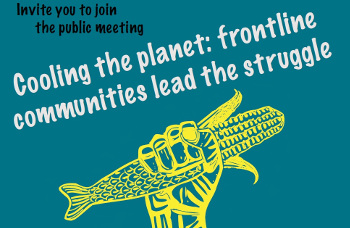COP21: Social movements and allies call for transformation of food systems

Global Convergence of land and Water struggles event on December 10, 2015 Venue: Salle Olympe de Gouge, Metro Voltaire (line 9)
 (Paris, December 10, 2015) Small-scale food producers and consumers, including peasants, indigenous peoples, hunters and gatherers, family farmers, rural workers, herders and pastoralists, fisherfolk and urban people – the frontline communities – are increasingly confronted by the grabbing of natural resources and by systematic violations of human rights. They are also directly affected by the impacts of climate destruction. The climate change mitigation schemes of the United Nations Framework Convention on Climate Change (UNFCCC) which are presented as “solutions” to the man-made climate crisis are false solutions given that they are intrinsically linked to these resource grabs and human rights violations.
(Paris, December 10, 2015) Small-scale food producers and consumers, including peasants, indigenous peoples, hunters and gatherers, family farmers, rural workers, herders and pastoralists, fisherfolk and urban people – the frontline communities – are increasingly confronted by the grabbing of natural resources and by systematic violations of human rights. They are also directly affected by the impacts of climate destruction. The climate change mitigation schemes of the United Nations Framework Convention on Climate Change (UNFCCC) which are presented as “solutions” to the man-made climate crisis are false solutions given that they are intrinsically linked to these resource grabs and human rights violations.
The Global Convergence of Land and Water Struggles is an initiative initiated and led by grassroots organizations and social movements in order to link and strengthen the struggles for food and peoples’ sovereignty and human rights.
This process started in October 2014, as several social and grassroots movements from Africa as well as civil society organizations gathered at the African Social Forum in Dakar to protest against all forms of natural resource grabbing and the systematic human rights violations that accompany them. Sharing their ideas, they recognized the essential solidarity between their struggles and decided to meet again at the World Social Forum to continue this dialogue with movements and organizations from all over the world. The declaration “Rights to Water and Land, a Common Struggle. Dakar to Tunis Declaration of the Global Convergence of Land and Water Struggles” sets out the vision, principles and aspirations of the Convergence and is intended to serve the process of building a strong and united movement struggling for the enforcement of public policies based on food and peoples’ sovereignty in order to realize the human rights to food and nutrition, water, land and territories, seeds, and others. The Global Convergence of Land and Water Struggles is a response by local communities and grassroots organizations around the world who assert their rights, provide real solutions and resist and struggle against the threats to their lives and well-being, particularly through the appropriation of natural resources by companies, governments, elites, and speculators.
Why this event?
Double impact: One of the most immediate effects of the false solutions to the current man-made climate crisis is people’s loss of access to land and water – the very natural resources upon which people depend for their livelihoods and food sovereignty. Privatisation and financialisation of nature is the intended result of UNFCCC schemes such as REDD+ and it is well known to dispossess masses of people. Already pushed to the fringe, deprived of access to land and water in rural and urban settings, frontline communities also face the increasingly frequent natural disasters that are caused by the climate change – and the inability of governments to agree to real solutions.
Systemic changes: the real solutions articulated by frontline communities derive from local livelihood strategies and practices. A commonality of the diverse – and locally adapted – real solutions, is that these build on the needs and interests of the people and require a fundamental shift away from solutions that are developed by and for a minority elite. In this way, real solutions are intrinsically linked to the necessity of systemic changes.
The Global Convergence on Land and Water Struggles unpacks and further develops the real solutions through frontline dialogue. The public event will advance this dialogue by giving the platform to frontline communities and ensuring space for interaction with the audience. In short, the convergence will show the way forward.
First session: The False Solutions
Form: A panel of 6 leaders from frontline communities. Basic criteria for who should be on the panel could be: gender balance; geographical representation; indigenous representation; and sector representation. The panelists represent communities, organizations or movements who are facing the consequences and fighting against the false solution. While the impacts of climate change on communities will be given due attention, the session will focus on the impacts of the false solutions and especially on identifying the best (political) strategies of struggles against them.
Second session: The real solutions
Same form and same basic criteria as for session one. The session should bring out knowledge and wisdom on local practices and the social and cultural contexts in which they are confined, and make visible how these differ from the neo-liberal, extractivist value system. The interventions should bring into the debate perspectives from different constituencies. It should become clear from these perspectives what system change as real response to the climate crisis means in concrete terms (as opposed to the partial tech-fix false solutions)
Third session: Taking the Global Convergence of Land and Water Struggles forward
Following this session, the audience should have a clear understanding of the false and real solutions and why they are relevant for land and water struggles; the need for converging struggles (linking struggles in different parts of the world as well as linking struggles at different levels); and how it is relevant in the context of broader political processes such as UNFCCC. It should be clear that there is a need for systemic changes, and that mass-mobilisation and solidarity are key ingredients to achieve such changes.
More information here : http://watergrabbing.net
